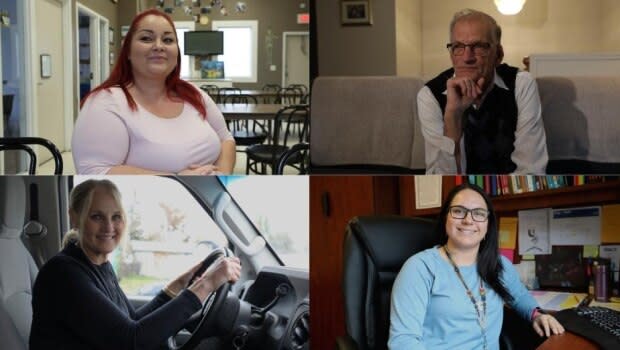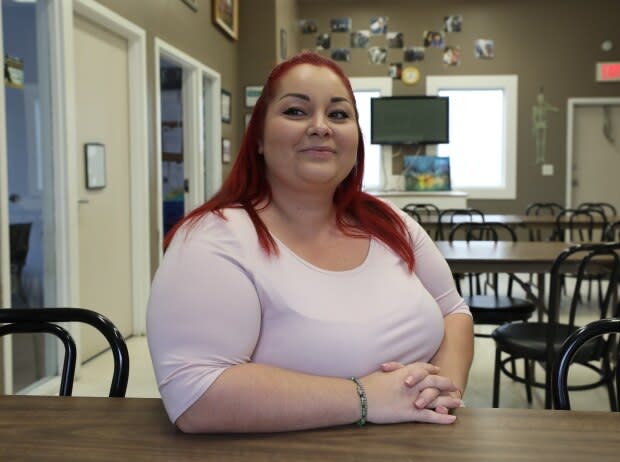'I want my voice heard': Get-out-the-vote effort underway in North Central
Sandy Wankel and her team are literally driving people to the polls in Regina's North Central — a neighborhood dealing with widespread poverty, addiction and violence.
"It's just the time to have a voice and that voice is really important," said Wankel, executive director of the North Central Family Centre (NCFC).
The small family centre is behind a big push to help people vote. More than half of the residents in North Central live below the poverty line and more than half aren't employed, according to the city's neighborhood profile.
NCFC will operate three vans taking people to the polls and offer free childcare on Monday.

North Central had one of the lowest voter turnouts in Regina on election day in 2015.
"When you have marginalized people that have never felt that they were part of the process and you're kind of beaten down, that doesn't surprise me. I think you find that in any society," Wankel said. "They think, 'What's the use of voting?' "
What's behind low turnout
Social barriers need to be addressed in order to create massive change in the community, said Morris Eagles, who moved to North Central in 1974. He moved out of the neighbourhood in May, but remains president of the North Central Community Association board.
It's a different neighborhood from what Eagles once knew. He's seen increases in drug use, vacant homes, cost of rent and the transient population.
"When people are caught in that rut, in those types of social issues, in reality, voting is the last thing on their mind," Eagles said.
He listed several factors that contribute to low turnout, mirrored in other communities with the same socio-economic challenges.

North Central is located in the rural-urban Regina-Qu'Appelle riding, which has a large Indigenous population. Eagles notes the low number of Indigenous candidates and said people aren't inspired to vote when they don't see themselves represented.
Lost faith in a system
Eagles said people in the community haven't seen positive change or growth. They've lost faith in the system as problems with mental health, housing, guns, gangs, poverty and addiction have grown.
"It's bread and butter issues. They've heard promises made by people running in elections during the election campaigns," he said. "A lot of those promises have never been fulfilled."
Eagles said others in the community are too busy focused on survival to think about the broader system. Four years can seem like a lifetime for those grappling with survival-based questions like whether to pay rent or buy food.
'People are energized'
Despite these challenges, Wankel has seen a subtle shift in participation this election cycle.
"I think people are more energized to get out there now when people are finding out what's important to them ... and their families."
Carla LaFontaine, 32, plans to vote for the first time.
"I have a bunch of peers that tell me it's a good idea," said LaFontaine, laughing. "It's probably that time that I should probably do it — put my say in."
The new process is a little bit scary for the NCFC youth worker. There's so much to consider.

LaFontaine said she fears making a mistake, or the wrong choice. She said she hasn't voted because she didn't know anything about the process and didn't know where to start.
"It's kind of intimidating for your first time voting — you don't want to make mistakes and you're not sure where to go," Wankel said.
That's why the NCFC hosted a public Elections Canada information session with soup and bannock earlier this month.
'An awakening'
The engagement at the election information session was "amazing," said Jamiy Moran, employment coordinator at NCFC. She's 30 and has always voted since being eligible.
"There's an awakening in the community," she said. "I see people who are historically beaten down and disadvantaged finding their own voices."
She said it's both empowering and overwhelming, particularly because advocacy is close to her heart.
"To make people feel important is a huge process."
She said she'll do anything to help people vote come Monday — even if it means walking beside someone to the polling station.

"As much as voting is important to the person it's voting for our community," she said, adding she has a close eye on Indigenous issues.
"Voting for the North Central community is reconciliation giving them a voice to overcome what's historically happened."
Part of the change
Community resident and youth worker Louis Felicien voted in advance. When he was 18, he didn't vote. Now, he is trying to get the teens he works with excited about voting.
"They are the future, however, if they want to see it [change] they need to be a part of it," he said
He joined a record number of people who went out to the advance polling stations this year.
"I want my voice heard," he said.
Felicien said sometimes the conversations seem to go over young peoples' heads because they're unfamiliar with politics. Other times, he sees the light bulb flicker.

Eagles said he hasn't heard strong rhetoric during this campaign targeted at the people dealing with these day-to-day challenges in low-income neighbourhoods across Canada.
He said the next federal government must act on issues and barriers affecting communities like North Central or nothing will change.
"Looking at the next four years, we could be sitting down talking about the same subject, addressing exactly the same thing."



